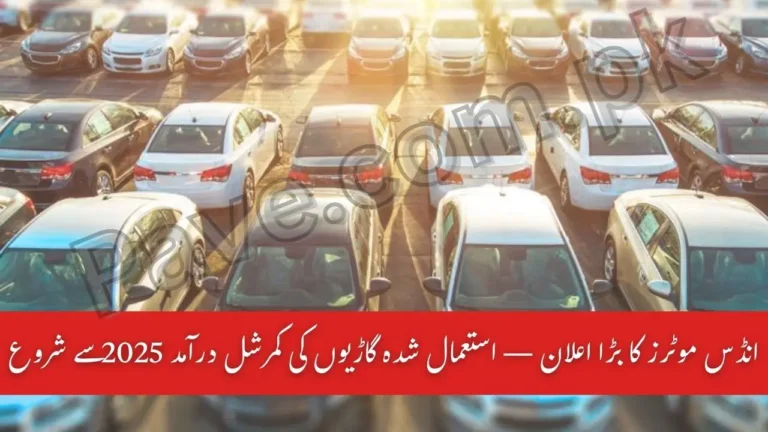Breaking News: Electric Vehicles and the Rise of Make-in-Pakistan Manufacturing
The global automotive industry is undergoing a seismic shift as countries worldwide pivot towards electric vehicles (EVs) to address environmental concerns, reduce reliance on fossil fuels, and usher in a cleaner, greener era of transportation. Electric Vehicles and the Rise of Make-in-Pakistan Manufacturing Pakistan, with its growing population, urbanization, and pressing environmental challenges, stands at a unique crossroads. The adoption of electric vehicles, coupled with the government’s “Make-in-Pakistan” initiative, has the potential to not only revolutionize the country’s transportation sector but also to reshape the automotive manufacturing landscape. This article explores the rise of electric vehicles in Pakistan and the pivotal role local manufacturing can play in driving the country’s sustainable future.
The Global Push for Electric Vehicles
Around the world, the move towards electric vehicles is being driven by several factors: climate change concerns, air pollution, government regulations, and the evolution of battery technologies. Countries like China, the European Union, and the United States have already seen rapid growth in their EV markets. Electric cars, buses, motorcycles, and even trucks are slowly becoming the norm in many parts of the world, bolstered by government incentives, tax exemptions, and sustainable energy policies.
Read Also: Punjab Farmers to Get Rs3 Crore Interest-Free Loans – Maryam
For Pakistan, where air quality in urban centers like Lahore and Karachi continues to deteriorate due to exhaust emissions from internal combustion engines, electric vehicles (EVs) provide a viable solution to reduce harmful emissions and combat climate change. However, Pakistan’s journey toward a fully-fledged EV industry is not just about adopting foreign technology; it’s about leveraging its own manufacturing capabilities through the “Make-in-Pakistan” initiative to build a robust and sustainable local EV market.
The Make-in-Pakistan Initiative: Unlocking Potential in Local EV Manufacturing
The “Make-in-Pakistan” initiative, spearheaded by the government, is designed to foster self-reliance, reduce dependency on imports, and boost local production across various industries. While the automotive sector in Pakistan has traditionally been dominated by fuel-powered vehicles, the government is shifting focus to electric vehicles by offering a wide range of incentives for local manufacturers to assemble, and eventually manufacture, EVs in Pakistan. This not only reduces the carbon footprint but also establishes the country as a key player in the emerging global electric vehicle market.
Incentives offered under the “Make-in-Pakistan” initiative include tax exemptions, reduced duties on electric vehicle components, and subsidies for manufacturers who produce electric vehicles locally. This makes Pakistan an attractive destination for international and local manufacturers seeking to tap into the growing EV market.
The initiative also aligns with Pakistan’s broader economic goals: it creates jobs, promotes technological innovation, reduces reliance on foreign currency for vehicle imports, and boosts exports in the long run. The “Make-in-Pakistan” framework for EVs is, therefore, not just a policy shift; it represents a long-term strategy to create a sustainable automotive ecosystem in Pakistan that benefits all stakeholders.
Localizing EV Manufacturing: Key Opportunities for Pakistan
1. Economic Growth and Job Creation
One of the most significant advantages of local EV manufacturing is its potential to create jobs. According to estimates, the local production of electric vehicles and their components could generate thousands of direct and indirect jobs in Pakistan. These jobs will range from manufacturing roles in assembly plants to high-skilled positions in research and development, engineering, and battery manufacturing.
Furthermore, Pakistan’s robust workforce and relatively low labor costs provide a competitive advantage in the global EV market. As the industry expands, local manufacturers will need to invest in training and development to build expertise in key areas such as electric motor design, battery technology, and vehicle software. This opens up immense opportunities for educational institutions and vocational training centers to develop specialized programs aimed at producing skilled workers for the growing EV sector.
2. Reducing Foreign Dependency
Currently, Pakistan imports a large number of its vehicles and automotive parts, which places a strain on foreign exchange reserves and increases the trade deficit. By shifting focus to electric vehicle production, Pakistan can reduce its reliance on imported vehicles and components, thereby keeping a larger portion of its automotive market within the country. This shift is especially crucial as electric vehicle components such as batteries and electric motors can be sourced locally or through partnerships with international EV component manufacturers.
3. Technological Innovation and R&D Investment
As Pakistan moves towards local EV production, there will be increased investments in research and development (R&D) to enhance the efficiency, performance, and affordability of locally made electric vehicles. R&D initiatives will focus on key areas such as battery technology, energy efficiency, vehicle design, and charging infrastructure. Over time, local manufacturers will be able to develop proprietary technologies, creating a unique competitive advantage in both local and international markets.
Moreover, Pakistan’s focus on “Make-in-Pakistan” can attract global players in the electric vehicle sector, who may look to establish joint ventures or partnerships with local manufacturers. This transfer of technology and know-how can significantly boost Pakistan’s capability to innovate and lead in the global EV space.
4. Environmental Sustainability
One of the most pressing concerns in Pakistan is the alarming levels of air pollution in major cities. According to reports, Electric vehicle Pakistan is one of the most polluted countries globally, with urban areas suffering from smog and deteriorating air quality due to vehicular emissions. The introduction and widespread adoption of electric vehicles will significantly reduce the number of harmful emissions, improving air quality and contributing to Pakistan’s overall environmental goals.
By promoting local EV production, Pakistan can also create a sustainable supply chain that prioritizes the use of renewable energy sources for charging infrastructure, further reducing the carbon footprint of transportation in the country.
Challenges to Overcome in the EV Manufacturing Journey
While the potential for growth is immense, there are several challenges that Pakistan must overcome to fully capitalize on the “Make-in-Pakistan” EV opportunity:
1. Infrastructural Development
One of the major hurdles in the widespread adoption of electric vehicles in Pakistan is the lack of sufficient charging infrastructure. The government and private sector must invest in establishing a network of charging stations across the country. A robust charging network is essential to reduce “range anxiety” among consumers and encourage them to make the switch to electric vehicles.
2. Battery Production and Sourcing
The battery is a core component of electric vehicles, and currently, Pakistan imports most of its batteries. To reduce costs and ensure a sustainable supply chain, Pakistan needs to invest in local battery manufacturing or establish partnerships with leading battery manufacturers. Establishing battery production facilities within Pakistan will reduce dependency on foreign suppliers and ensure the steady availability of this crucial component.
Read Also: Become a Tax Filer in Pakistan in 2025: Complete Details
3. Public Awareness and Consumer Confidence
Despite the growing interest in electric vehicles, a lack of awareness among the general public remains a significant barrier. Many consumers are unaware of the benefits of EVs, including lower operating costs, tax exemptions, and environmental impact. Government-led campaigns and collaborations with manufacturers can help educate consumers about the long-term advantages of switching to electric vehicles.
4. Initial Investment and Affordability
While EVs are becoming more affordable, the initial cost remains a challenge for many Pakistanis. To address this, the government must provide more subsidies for EV buyers, ensuring that electric vehicles are within reach of a larger segment of the population. Financial institutions can also play a key role by offering low-interest loans to buyers of electric vehicles, further improving affordability.
The Road Ahead: Pakistan’s EV Future
Pakistan’s transition to local electric vehicle production through the “Make-in-Pakistan” initiative is poised to redefine the country’s automotive landscape. By leveraging local manufacturing capabilities, Pakistan can address its environmental challenges, reduce its dependency on foreign vehicle imports, create jobs, and promote innovation in technology.
While obstacles such as infrastructure development, battery production, and consumer awareness remain, the future of EV manufacturing in Pakistan looks promising. With continued government support, investment in R&D, and the building of a robust EV ecosystem, Pakistan has the potential to become a leading player in the global electric vehicle market.
Conclusion: A Greener, More Sustainable Future for Pakistan
The rise of electric vehicles in Pakistan is more than just a technological shift; it represents a commitment to a greener, more sustainable future. The “Make-in-Pakistan” initiative, when fully embraced by the government, manufacturers, and consumers, could lead to the creation of a self-sustaining EV ecosystem that serves as a model for other countries in the region. By prioritizing local manufacturing, Pakistan can reduce its environmental footprint, enhance its economic stability, and ultimately drive the country towards a cleaner, greener, and more sustainable future.







